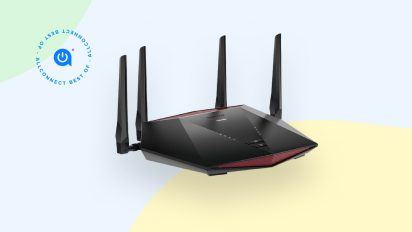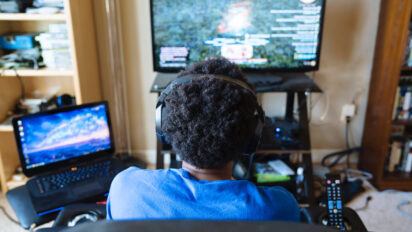Modern video gaming is about focus, collaboration, dexterity and above all, speed. Although quick thinking and even quicker hands are definitely a must, sometimes it’s your internet speed that can make or break your gaming experience.
Take a look at what’s a good internet speed for gaming and get an understanding of how internet speed affects game performance.
Minimum speed recommendations by video game type
First person shooters (FPS)
First person shooter games, or FPS, are played from the point of view of the main character. This genre of video games typically shows the character’s arms toward the bottom of the screen carrying their weapon of choice. FPS games like Doom Eternal require faster ping rates in order to keep players on pace with real-time action.
- Recommended for Doom Eternal on Google Stadia
- Download speed: 30 Mbps
- Upload speed: 1 Mbps
- Ping rate: 16 ms
Real-time strategy games
Real-time strategy games are time-based and make players use available resources to defend their base and defeat an opponent who has the same goals. A real-time strategy game which features a constantly evolving game state can be played on a PC, but a gaming console like the Xbox 360 can help maximize slower internet speeds and ping rates.
- Recommended for Anno 1800 on Xbox 360
- Download speed: 3 Mbps
- Upload speed: 0.5 Mbps
- Ping rate: 150 ms or less
Role-playing games (RPG)
RPGs or role-playing video games allow gamers to control a fictional character and complete a quest in a fantasy world. RPGs typically include levels or stats that can be improved, a menu-based combat system and a quest that drives the storyline of the game.
- Recommended for Xenoblade Chronicles on Nintendo Wii U
- Download speed: 1.5 Mbps
- Upload speed: 1 Mbps
- Ping rate: 150 ms
Massively Multiplayer Online (MMO) games
Massively multiplayer online video games take place in a fictional world where millions of people just like you are playing in a role-playing environment. The goal is not to “complete” the game, as in standard RPGs, but to build up a character’s experiences, skills and resources. Communication within the game via Skype requires more bandwidth.
- Recommended for FortNite Battle Royale on Xbox One
- Download speed: 3 Mbps
- Upload speed: 0.5 Mbps
- Ping rate: 150 ms or less
Pro tip: Gaming systems and services often give minimum internet speed recommendations for optimum performance. These suggestions are usually based on a single player and are most helpful as a starting point. If your household has multiple gamers, multiply these speeds by the number of users that will utilize your connection.
How fast is your internet speed?
Are you always just a split second behind the rest of your team during a high-speed campaign? Test your connection today to find out if your internet speeds can keep up with your gaming. Remember to pause any online activity during the test as this may skew your results.
Need more for the price?
Try these helpful hacks to improve your internet speed. Or if you just want more bang for your buck, check out providers near you with more speed for the price. Either way, we’ll help you find what you need.
View providers near meRather chat? Give us a call: (844) 451-2720
Rather chat? Give us a call: (844) 451-2720Pro Tip: For best results, use an Ethernet cord to connect your router or modem directly to your device before you run the test.
Why internet speed matters in gaming
When gaming with slow internet speeds, lag, or slow computer response, may be your biggest opponent. After all, the ideal gaming experience allows for real-time movement and action between players.
If your gaming is lagging, you may experience a “buffering” effect to your activity. While others are immersed in a fast-paced battle, your computer may finally load for you to find that not only have you been hit, but the game has moved on without you.
Although many resources will provide a general speed recommendation for different types of gaming, it’s best to look at upload speed, download speed and ping rate, as these factors contribute to game lag the most.
Download vs. upload speed
When you initially purchase your internet plan, you’ll commonly see an “advertised speed” that will serve as your internet download speed. However, both your download and upload speed contribute to the quality of your gaming experience.
Download speed measures how long it takes for information to travel from your server to your gaming device. Upload speeds refer to how long it takes for information to travel from your gaming device to the server. The best upload and download speed for you will depend on how many players are online at any given time; however, it’s advised to get the highest speeds for flexibility.
Ping rate
Ping rate, also known as latency, is also important to your gaming performance and refers to the speed in which your device communicates with the internet server. Measured in milliseconds (ms), higher ping rates mean slower gaming even if you have the internet speeds to back up your activities.
A ping rate of 20 ms is ideal, but you can comfortably game with higher ping rates 50 to 100 ms as well. Satellite internet usually has considerably higher latency than other internet types, which is why it cannot support real-time online gaming.
7 hacks for improving your online gaming connection
Is a spotty connection frustrating your game time? Not to worry, there are a few ways to improve your connection to boost speeds and lower ping. Next time your game is lagging or load times seem a bit excessive, try these quick hacks for getting a better speed for gaming.
1. Use a wired connection
Ethernet connections will almost always give you a faster, more reliable internet connection with lower ping. Choose the right Ethernet cord for your internet service and use it to connect your computer or gaming console. You may have to reconfigure your internet settings to use the wired connection instead of Wi-Fi.
2. Invest in Wi-Fi extenders, or game closer to the router
If a wired connection isn’t practical, or you’re gaming on a Wi-Fi device such as a tablet or smartphone, you need close, unobstructed access to those precious Wi-Fi signals. Wi-Fi extenders can boost signal range so you can game in more places around the house, or you can try moving closer to the router for a better connection. Additionally, you can try these ways to boost your Wi-Fi connection.
3. Reset your modem or router and check connections
Modems and routers run 24/7 and will occasionally need a reset to keep them running at optimal performance. If your internet is going in and out or your game starts lagging all of the sudden, try resetting your modem and router. If that doesn’t work, check to make sure all connections are sufficient and secure. To help ensure a seamless gaming experience, you may want to reset your router before starting any major gaming events.
4. Disconnect/close other bandwidth-hogging devices/pages
When gaming on your computer or mobile device, it’s possible that other web pages or apps could be running in the background, limiting your available bandwidth for gaming. As for gaming consoles, many are set to automatically download game and software updates. If a download begins while you’re playing online, it could seriously and abruptly hinder your connection. Check for any pending downloads and close or disconnect any bandwidth vampires before gaming.
5. Adjust game settings
Some games let you adjust frames per second (fpr) and resolution settings. While opting for the most crisp and clear image looks good, it requires more bandwidth and could be the reason for lagging and excessive loading. This tip can be especially useful when playing on game streaming services such as PlayStation Now and Google Stadia.
6. Secure your Wi-Fi connection
Even if you’re using an Ethernet cable, someone piggybacking off your Wi-Fi can slow your connection. Not only that, but they could also use the connection to access personal information on your other devices. Know how to detect uninvited Wi-Fi users and keep your network secure.
7. Upgrade your internet service and/or equipment
Sometimes your internet connection is doing all it can do and the only remedy is to upgrade. A faster internet plan can give you a much-needed speed and ping boost. Or, if you already have a high-speed plan but your actual speeds are much lower, try upgrading your router to one more suited to your needs. Here’s our list of the best routers for gaming.
Gaming speeds FAQs
Does internet connection type affect my gaming speed?
Yes. Some internet connection types are more compatible with high-speed gaming than others. Fiber and cable internet connections are best suited for avid video gamers as they typically provide faster internet speeds and transmit data at much higher rates. DSL and satellite connections are least suited for gaming — satellite internet plans often come with data caps and distance-related latency issues.
What’s my ping rate?
Ping rate is a measure of how quickly you receive a response from your game once a request is made. In other words, if you press “jump,” how quickly does your character actually jump? Ping rate is measured in milliseconds (ms) and higher numbers correlate with slower response times. Typically, if you can find out a game’s required frames per second, or FPS, you can convert that number to learn the recommended ping rate as well.
Shop the speeds you need for gaming
The internet speed you need is closer than you think. Follow the experts on our Resource Center for more tips and tricks on how to maximize your internet speed for your favorite online activities.
Last updated 11/01/19.
Written by:
Taylor GadsdenWriter, Broadband Content
Taylor is a veteran member of the Allconnect content team and has spearheaded a number of projects, including a data piece on the top fiber cities in the U.S. and a troubleshooting guide on how to connect your p…
Read more
Edited by:
Trey PaulEditor, Broadband Content
-
Featured
![Best modems and routers for gaming of 2024]() Best modems and routers for gaming of 2024 AJ Dellinger — 6 min read
Best modems and routers for gaming of 2024 AJ Dellinger — 6 min read -
Featured
![Survey: Gamers frustrated by slow download speeds]() Survey: Gamers frustrated by slow download speeds Allconnect — 2 min read
Survey: Gamers frustrated by slow download speeds Allconnect — 2 min read -
Featured
![30% of Americans say their internet is too slow. Here’s how to fix it]() 30% of Americans say their internet is too slow. Here’s how to fix it Joe Supan — 4 min read
30% of Americans say their internet is too slow. Here’s how to fix it Joe Supan — 4 min read
Latest
-
Thursday, July 25, 2024
Worried about losing your signal? This is how to keep your satellite dish cleanDavid Anders — 6 min read
-
Tuesday, July 23, 2024
The best free TV and movie streaming services 2024Camryn Smith — 5 min read
-
Tuesday, July 23, 2024
Everything you need to know about internet speedsRobin Layton — 8 min read





